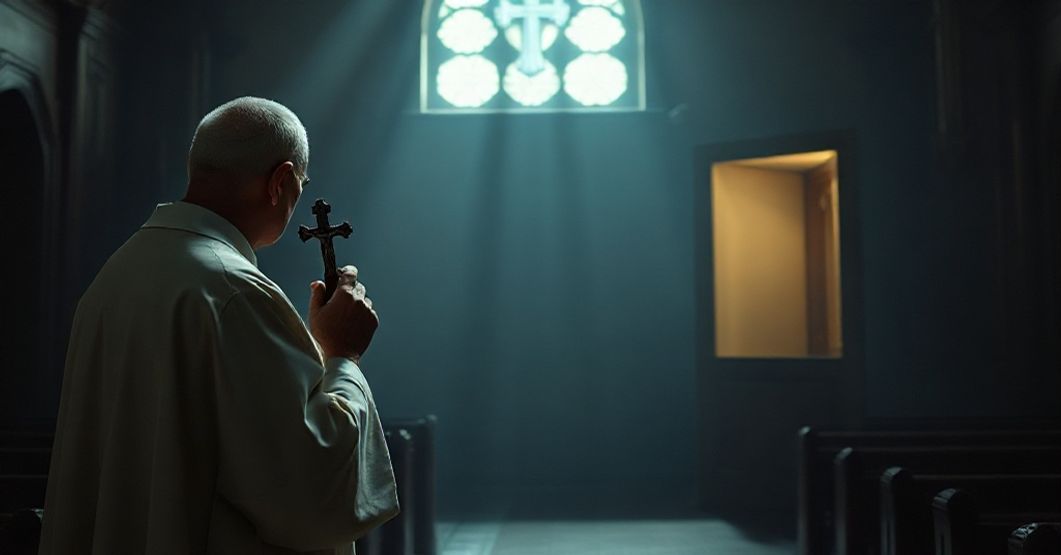Humanistic Suicide Prevention Masks Apostate Church’s Denial of Supernatural Order
Humanistic Suicide Prevention Masks Apostate Church’s Denial of Supernatural Order
The conciliar sect’s antipope Leo XIV (Robert Prevost) has issued a November “prayer intention” focused on suicide prevention through “community support” and “professional help,” conspicuously omitting the supernatural remedies of sacramental grace and repentance. The VaticanNews portal (November 4, 2025) promotes this naturalistic approach, urging the “faithful” to pray that suicidal individuals “find a community that welcomes them” and receives “necessary professional help,” while reducing Christ to a vague comforter of “the weary and burdened.” This manifesto of therapeutic despair exemplifies the apostate sect’s total abandonment of depositum fidei (the deposit of faith).
Erasure of Sin and Judgment in Favor of Psychological Relativism
The text declares that “even those who follow Jesus are vulnerable to sadness without hope” – a direct contradiction of St. Paul’s assurance that “we are more than conquerors through Him who loved us” (Romans 8:37). Pius XI condemned such despair as contrary to Catholic hope: “The hope of lasting peace will not yet shine upon nations as long as individuals and states renounce and do not wish to recognize the reign of our Savior” (Quas Primas, §1). By reducing spiritual warfare to mental health management, the conciliar sect denies the ex opere operato (by the work performed) efficacy of sacraments.
Nowhere does the text mention:
- The mortal sin of self-murder (Catechism of St. Pius X: “Suicide is a grave crime against God”)
- The necessity of sacramental confession for forgiveness of sins (Council of Trent, Session XIV)
- The eternal consequences of dying in unrepentant sin (Matthew 25:46)
This silence constitutes implicit denial of defined dogma. The 1917 Code of Canon Law (Canon 1240) prohibited ecclesiastical burial to suicides unless evidence of repentance existed – a disciplinary witness to eternal truths now discarded by the neo-church.
Naturalism as Replacement for Redemptive Grace
The video’s proposed remedies – “professional help,” “community support” – embody Pius IX’s condemnation of those who believe “human reason is the sole arbiter of truth” (Syllabus of Errors, §3). Leo XIII warned that removing Christ from lawmaking produces societies where “the entire human community had to be shaken, because it lacked a stable and strong foundation” (Immortale Dei, §13).
Contrast this with the true Church’s solution to despair:
“The sacraments… contribute to the opening and restoration of inner sight so that souls may turn from darkness to light” (St. Thomas Aquinas, Summa Theologica III q.61 a.1)
By replacing exorcisms with therapy and Eucharistic adoration with “community building,” the conciliar sect fulfills St. Pius X’s prophecy: “Modernists place the foundation of religious philosophy in that doctrine which is usually called Agnosticism” (Pascendi Dominici Gregis, §6).
Linguistic Betrayal of Catholic Lexicon
The text employs deliberately ambiguous terminology:
- “Darkness and despair” replaces “mortal sin”
- “Be open to the beauty of life” substitutes for “repent and believe in the Gospel” (Mark 1:15)
- “Respect and tenderness” displaces “fraternal correction” (Matthew 18:15)
This linguistic corruption stems from Vatican II’s Gaudium et Spes which declared that “atheism springs from a violent protest against the evil in the world” (§19) – a precursor to today’s normalization of despair as a psychological condition rather than spiritual rebellion.
Symptomatic of Total Apostasy
The video’s production by the “Pope’s Worldwide Prayer Network” (formerly Apostleship of Prayer) exposes its Masonic origins. St. Pius X condemned such interfaith prayer initiatives as “indifferentism, that is, the fatal theory that all religions are good” (Editae Saepe, §24). The collaboration with “Coronation Media” and “La Machi agency” – entities promoting New Age spirituality – confirms the conciliar sect’s syncretistic agenda.
This suicide prevention campaign follows the modernist playbook described in the Holy Office’s decree Lamentabili Sane (1907), which condemned the proposition that “Revelation was merely man’s self-awareness of his relationship to God” (§20). When the text claims “life is a gift” without specifying the Giver or the gift’s purpose (eternal beatitude), it reduces Christianity to pagan vitalism.
Conclusion: A Church That Cannot Save
The article’s closing appeal for donations to “bring the Pope’s words into every home” reveals the mercantile core of conciliar religion. As Pius XI taught, true peace comes only when nations “allow themselves to be governed by Christ” (Quas Primas, §21). By contrast, this suicide initiative – devoid of references to hell, penance, or sacraments – constitutes spiritual malpractice. It confirms the conciliar sect’s status as the synagoga Satanae (synagogue of Satan) foretold in Revelation 2:9, which comforts sinners in their destruction rather than snatching them “from the fire” (Jude 1:23).
Source:
Pope's November prayer intention: 'for the prevention of suicide' (vaticannews.va)
Article date: 04.11.2025
